|
|
|
Sort Order |
|
|
|
Items / Page
|
|
|
|
|
|
|
| Srl | Item |
| 1 |
ID:
159970
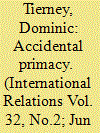

|
|
|
|
|
| Summary/Abstract |
Why did states fail to balance against the United States after the end of the Cold War? Scholars have neglected an important dynamic: the accidental nature of America’s rise to primacy. The United States became the sole superpower not by deliberately increasing its capabilities but due to the unexpected collapse of its rival, the USSR. The case illustrates that a state’s responsibility for its gains in power can vary significantly, with important consequences for subsequent balancing. Active or deliberate power increases tend to produce more balancing than passive power increases because they signal aggressive intentions, alter the dyadic power balance between the rising state and potential balancers, and trigger loss aversion.
|
|
|
|
|
|
|
|
|
|
|
|
|
|
|
|
| 2 |
ID:
071315
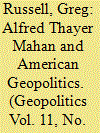

|
|
|
|
|
| Publication |
2006.
|
| Summary/Abstract |
Debate about the goals of American foreign policy at the end of the twentieth century, especially that thread differentiating "conservative" from "neoconservative" perspectives, might profit by revisiting the debate over American expansion at the end of the nineteenth century. "I am an imperialist," Captain Alfred Thayer Mahan once remarked, "simply because I am not isolationist." This paper explores the connection between Mahan's defense of imperialism-often couched in terms of national interest and balance of power- and the norms of American power in world politics. The will-to-power behind American expansion and involvement, a formidable pillar in Mahan's realism, coexisted (often uneasily) with the affirmation of national purpose, a less formidable but still important part of Mahan's idealism. Mahan's strong conservative inclinations in politics were matched by a willingness to employ the tools of realism-particularly traditional diplomatic methods-as a way to uphold historic national goals and moral vision in American foreign policy. Far from seeing an irremediable conflict between the counsels of realism and limited moral gains in foreign policy, Mahan understood that governments are not immune from certain overall constraints. Seldom if ever could American actions abroad be defended by arguing solely for the maintenance or increase of national power.
|
|
|
|
|
|
|
|
|
|
|
|
|
|
|
|
| 3 |
ID:
108622
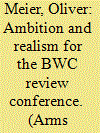

|
|
|
|
|
| Publication |
2011.
|
| Summary/Abstract |
Paul van den IJssel, the Dutch ambassador to the Conference on Disarmament, is president-designate of the 2011 Biological Weapons Convention (BWC) Review Conference, which is scheduled to take place December 5 to 22. He is a career diplomat in the Dutch Ministry of Foreign Affairs.
Van den IJssel spoke with Arms Control Today by telephone from Geneva on September 30 about the upcoming review conference. He said he was seeing a "convergence of views" on many of the key issues, but emphasized that there still is much work to be done to close the remaining divisions on technical and political issues.
|
|
|
|
|
|
|
|
|
|
|
|
|
|
|
|
| 4 |
ID:
155790
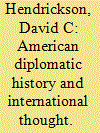

|
|
|
|
|
| Summary/Abstract |
This essay offers a constitutional perspective on the American encounter with the problem of international order. Its point of departure is the American Founding, a subject often invisible in both the history of international thought and contemporary International Relations theory. Although usually considered as an incident within the domestic politics of the United States, the Founding displays many key ideas that have subsequently played a vital role in both international political thought and IR theory. The purpose of this essay is to explore these ideas and to take account of their passage through time, up to and including the present day. Those ideas shine a light not only on how we organize our scholarly enterprises but also on the contemporary direction of US foreign policy and the larger question of world order.
|
|
|
|
|
|
|
|
|
|
|
|
|
|
|
|
| 5 |
ID:
116295
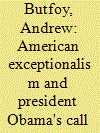

|
|
|
|
|
| Publication |
2012.
|
| Summary/Abstract |
President Obama came to office promising to make abolition of nuclear weapons a central policy goal. Conventional explanations for the arguably poor progress made here (explanations which focus on political and bureaucratic processes) fail to capture an important part of the story. This is that the president comes from a political tradition marked by exceptionalist assumptions. This tradition encompasses a distinctly American attempt to converge idealism and realism; it seeks change, but also constrains aspirations within conservative limits. His conception of exceptionalism is based on a presumption of American moral leadership integrated with a requirement for continued American strategic primacy. As a result, his view of abolition requires global acceptance of American conventional military superiority, reinforcing doubts about the vision's prospects.
|
|
|
|
|
|
|
|
|
|
|
|
|
|
|
|
| 6 |
ID:
057957
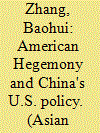

|
|
|
| 7 |
ID:
055918
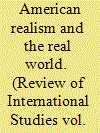

|
|
|
| 8 |
ID:
064660
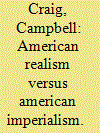

|
|
|
| 9 |
ID:
165317
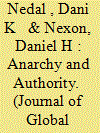

|
|
|
|
|
| Summary/Abstract |
Do international systems tend to remain anarchic because of recurring balances of power, or do they tend toward imbalances and hierarchy? Leading structural theories posit competing predictions about systemic outcomes, and the historical record offers evidence to support both claims. This suggests the need to theorize conditions under which one tendency or another is likely to dominate and what factors lead systems to transition from one state to another. We draw on constructivist and English School insights about international authority and legitimacy to develop such a framework. We conceive of patterns of international authority as structures independent from, and interacting with, mechanisms usually associated with international anarchy, such as the balance of power. We propose that international authority systems vary along two dimensions: particularist cosmopolitan and substitutable nonsubstitutable. Both are emergent properties of ideas and institutions located at the unit level. We argue that certain authority systems—particularist and nonsubstitutable—reinforce, and are reinforced by, anarchy and balanced distributions of capabilities. Others—cosmopolitan substitutable—facilitate rollup and domination and are likely to emerge or be maintained in hierarchic and highly asymmetric systems. By offering a structural account of international authority, we hope to contribute to the global turn in international relations, offering a framework for comparing systems across time and space. We also aim to help make sense of contemporary struggles over norms and values, their structural causes and consequences, and their potential implications for the future of global power politics.
|
|
|
|
|
|
|
|
|
|
|
|
|
|
|
|
| 10 |
ID:
097016


|
|
|
|
|
| Publication |
2010.
|
| Summary/Abstract |
Researchers use survey experiments to establish causal effects in descriptively representative samples, but concerns remain regarding the strength of the stimuli and the lack of realism in experimental settings. We explore these issues by comparing three national survey experiments on Medicare and immigration with contemporaneous natural experiments on the same topics. The survey experiments reveal that providing information increases political knowledge and alters attitudes. In contrast, two real-world government announcements had no discernable effects, except among people who were exposed to the same facts publicized in the mass media. Even among this exposed subsample, treatment effects were smaller and sometimes pointed in the opposite direction. Methodologically, our results suggest the need for caution when extrapolating from survey experiments. Substantively, we find that many citizens are able to recall factual information appearing in the news but may not adjust their beliefs and opinions in response to this information.
|
|
|
|
|
|
|
|
|
|
|
|
|
|
|
|
| 11 |
ID:
121651
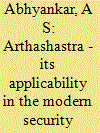

|
|
|
| 12 |
ID:
087564
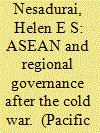

|
|
|
|
|
| Publication |
2009.
|
| Summary/Abstract |
This paper first reviews and critiques the dominant realist and constructivist accounts of ASEAN, which have enjoyed much prominence in The Pacific Review since the journal's founding in 1988. ASEAN behaviour and outcomes cannot be fitted into neat theoretical categories that emphasize either material or ideational variables in explanation. Instead, ASEAN displays complexities in behaviour that are the product of the contingent interaction between the material (power, territory, wealth) and the ideational (norms, ideas, identity) as member states actively seek to manage domestic order as well as regional order within and beyond ASEAN. In all of this, state interests and identities remain paramount, which means that the long-standing ASEAN norms of sovereignty/non-interference remain central to regional governance.
|
|
|
|
|
|
|
|
|
|
|
|
|
|
|
|
| 13 |
ID:
085856
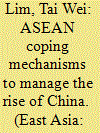

|
|
|
|
|
| Publication |
2008.
|
| Summary/Abstract |
ASEAN has been proactive in reacting to the economic and political challenges of the rise of China without being overly hostile, reactionary or protectionist against China in a conscious effort to co-prosper with China herself. At the same time, smaller ASEAN neighbours of China hope that China will continue to pursue a policy of good neighbourliness. With this background in mind, the thesis questions for the essay are: what are ASEAN's coping mechanisms to manage the rise of China? How do these questions feature into the overall tussle of ideas between realists and non-realists?
|
|
|
|
|
|
|
|
|
|
|
|
|
|
|
|
| 14 |
ID:
060618
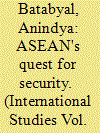

|
|
|
|
|
| Publication |
Oct-Dec 2004.
|
|
|
|
|
|
|
|
|
|
|
|
|
|
|
|
| 15 |
ID:
128739


|
|
|
|
|
| Publication |
2014.
|
| Summary/Abstract |
In this article I view Asian alliances as a product of universal security needs and culturally constructed variables. While the alliance remains one of the fundamentals of contemporary international politics, I attempt to show through comparative analysis of the Sino-Soviet alliance and the Japan-US security alliance how subtle differences of national developmental experience can significantly affect political outcomes in East Asia.
|
|
|
|
|
|
|
|
|
|
|
|
|
|
|
|
| 16 |
ID:
112875
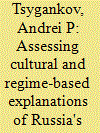

|
|
|
|
|
| Publication |
2012.
|
| Summary/Abstract |
Scholars disagree on how to interpret Russia's assertive foreign policy. According to some observers, Russia's authoritarian culture and political system have historically required the Kremlin to depend on the Western threat image at home and to engage in revisionist behaviour abroad. These observers recommend that Western nations abstain from engaging Russia as an equal contributor to shaping the global system. This article assesses the validity of the authoritarian expansionism theory by comparing it to other prominent perspectives on foreign policy, realism and constructivism. The article argues that, by perceiving Russia's historical and institutional distinctness as fundamentally threatening to the West, the theory overlooks important sources of foreign policy contestation at home and potentially varying directions abroad. The article selects the historically important cases of the Crimean War, the Cold War and the Russia-Georgia War to demonstrate the theory's flaws and to highlight the role of factors other than Russia's authoritarianism in the nation's foreign policy.
|
|
|
|
|
|
|
|
|
|
|
|
|
|
|
|
| 17 |
ID:
108143
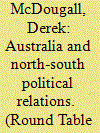

|
|
|
|
|
| Publication |
2011.
|
| Summary/Abstract |
North-South issues as such do not figure prominently in Australia's international policy but are mostly implicit. These issues arise particularly in the context of Australia's relations with countries in its immediate vicinity, including the South Pacific, Indonesia and East Timor. There are also some global issues in the North-South context where Australia is affected. Australian governments, in developing policies relating to this context, have been influenced by a 'practical realism' that puts first priority on Australian interests as perceived by governments at any given time. The way in which those policies have been developed, in both the regional and the global contexts, can be assessed through an examination of issues relating to security and international economic relations. Australia's alliance relationship has a strong bearing on the way Australia approaches the security issues. In relation to international economic issues there are many commonalities with fellow producers of raw materials in the Global South.
|
|
|
|
|
|
|
|
|
|
|
|
|
|
|
|
| 18 |
ID:
086296
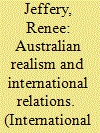

|
|
|
|
|
| Publication |
2008.
|
| Summary/Abstract |
John Anderson, Professor of Philosophy at the University of Sydney from 1927 to 1958, is not conventionally viewed as having exerted a significant influence on the development of international relations in the 20th century. Indeed, his contributions to philosophical realism and public debate in Australian society have been more readily acknowledged as his major spheres of influence. However, Anderson must also be credited with having exerted a significant influence on the intellectual development of one of the most prominent international relations theorists of the 20th century, his student Hedley Bull. With this in mind, this article assesses the impact of Anderson's teachings on Bull's thought and argues that although Bull deviated from his earliest mentor's more extreme views about ethical inquiry, his general approach to the study of international relations, understanding of international society, and sceptical attitude towards religion can, in large part, be derived from Anderson's teachings.
|
|
|
|
|
|
|
|
|
|
|
|
|
|
|
|
| 19 |
ID:
114769
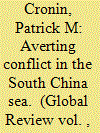

|
|
|
| 20 |
ID:
077743
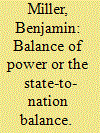

|
|
|
|
|
| Publication |
2006.
|
| Summary/Abstract |
The Middle East is one of the most war-prone regions in the international system. What is the most powerful explanation of the war-propensity of this region? I argue that neither realism nor liberalism are able to account for variations in regional war-proneness. Instead, I advance an alternative explanation based on the concept of the state-to-nation balance in the region. This balance refers to the degree of congruence between the division of the region into territorial states and the national aspirations and political identifications of the region's peoples. The balance also refers to the prevalence of strong versus weak states in the region. Thus, I explain the Middle East's high war-proneness by focusing on its relatively low level of state-to-nation balance. This imbalance has led to a powerful combination of revisionist ideologies and state incoherence. While other regions suffer from state incoherence, powerful revisionist nationalist forces, notably pan-nationalist and irredentists (the "Greater State"), aggravate this problem in the Middle East. These revisionist forces are often transborder and are especially powerful in the Middle East because of the high degree of external/transborder incongruence in comparison with all other regions. The combination of nationalist revisionism and state incoherence has made the Middle East more prone to violence than most other regions
|
|
|
|
|
|
|
|
|
|
|
|
|
|
|
|
|
|
|
|
|